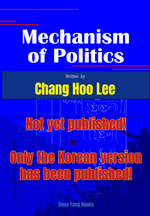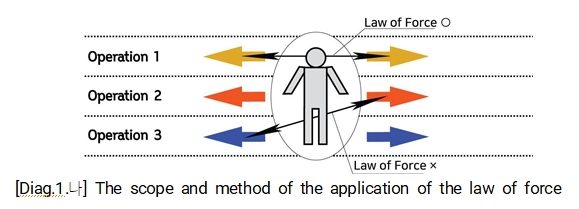| |
Chapter 1. Basic Principles
of Political Phenomena
A. General Principles of Political
Phenomena
(2) The 2nd Law of Naturality:
Law of Force

Second, "Law of Force" means
that strong force always wins against weak force.
When there is a force pushing an object to the right
and a force pushing it to the left, if the force pushing
it to the right is stronger, the object will be pushed
in that direction. This physical law can be conceptually
generalized and applied to political phenomena, meaning
that the law of force is as follows:
| |
[Ch.1.10] For every
kind of action (force), a stronger action (force)
has a greater impact than a weaker one. |
If Peter and Kevin collide with full
force, the person with stronger force wins. Also,
if Kevin and Ben compete with economic power, the
person with more assets achieves more of what they
want. When Peter and Ben try to persuade Kevin, if
Peter's persuasion logic is better than Ben''s, then
Kevin is persuaded by Peter. This is what the law
of power means. This applies consistently from physical
phenomena to biological or human phenomena. Therefore,
it is also the same in terms of mental power, cultural
influence, and moral justice.
In 1794, the Poles rebelled against
the division and annexation of Poland by Russia and
Prussia, but they were crushed. During the Chinese
Communist Party's struggle against the Chiang Kai-Shek
army, the peasant guerillas in the countryside were
united ideologically, but they still lost all battles
because they were greatly outmatched in terms of manpower
and weaponry. These examples demonstrate that the
law of force dominates. The fact that more political
actions on a larger scale follow the law of force
is even clearer. At the end of the 19th century, during
the African colonization, the Europeans who sat at
the negotiating table drew straight lines on maps
to determine the boundaries of their territories.
Africa had 190 communities that were fragmented or
on the other hand, 250 ethnic groups were bound together
in Nigeria and 6,000 chiefdom societies were included
in the Belgian Congo colony, among others. Europeans
had strong military power, whereas the Africans were
greatly weakened in comparison.
The point to be careful of is that
even in mental strength or moral justifications, the
law of force still operates. The Nazi Germany and
Imperial Japan had no difference in terms of massacring
innocent people during World War II. However, while
Nazi Germany became the symbol of evil in the 20th
century, Imperial Japan did not. This is because the
criticism and publicity capacity of the Jews who suffered
from the Nazi was greater, while the criticism and
publicity capacity of Korea and Taiwan, who suffered
from Japan, was smaller than that of Japan.
Some people seem to find a disdain
for morality in the law of force. In this case, the
law they are trying to adopt instead of the law of
force is the law of mental or moral strength. When
Nazi Germany invaded and occupied France with its
strong military power, or when the Japanese Empire
dominated weak Joseon and massacred its population,
it was clearly (no matter who sees it) that Nazi Germany
and the Japanese Empire were evil forces. The law
of force gives the impression of positively endorsing
such evil forces.
However, the law of force that I
am referring to does not mean to positively endorse
the dominant power (morally), nor does it disdain
morality. When we say "Nazi Germany had power
but was evil," we are only limiting our focus
to the fact that "they had power." If we
want to overcome the irrationality of chroniclers
of the Western Middle Ages who sought only divine
providence while ignoring military issues when recording
the history of war, we must acknowledge the reality
that strong powers conquer and dominate weak powers
regardless of good and evil. In political theory,
it is necessary to limit our interests there, just
as we think about how a truck trying to hit a child
operates.
Different Kinds of Forces
When applying the law of force to
systematically understand complex political phenomena,
it should be limited to the same kind of forces. The
law of force does not work between different kinds
of forces. In the same way that there are forces that
move objects in natural phenomena, there are also
different forces that corrode objects, similarly,
there are also various forces that act differently
in social phenomena.
First of all, undoubtedly, military
power is an important force in political phenomena.
The victory of the United States over Britain in the
War of Independence was not due to issues of legitimacy
but rather to the superiority of military power. Similarly,
economic power is also an important force in social
phenomena, and the law of force applies here, just
as a local government or a large corporation may receive
money under various names when choosing a main trading
bank. The more powerful economic power will exert
greater influence, just as the one who offers a higher
price wins the auction item.
As a part of the truth, ideals or
moral legitimacy are also clearly important factors
that change the size and balance of power, just like
other types of factors. Because of many misunderstandings,
it should be emphasized again that the law of force
with respect to ideals or morality is not about those
who have power gaining honor or morality, rather it
means that a force with stronger ideals or morality
will dominate a force with weaker ideals and morality
in that aspect.
Ideals and legitimacy as a fact generally
appear as the power to persuade others, and it would
be easier to understand this concept if one thinks
that those with strong persuasion skills are winning
in terms of persuasion against those with weak persuasion
skills. In 1858, in the United States, Lincoln dominated
the argument with Douglas over slavery in terms of
persuasion, which was the power of ideals and legitimacy.
As a more macro-level example, in the mid-1900s in
Congo, ethnic conflicts had a greater impact than
conflicts between imperialism and colonialism, which
later influenced the political situation in Congo.
This is also an example of the problem of legitimacy
in ethnic conflicts being stronger than the problem
of legitimacy in imperialism conflicts. As mentioned
earlier, the atrocities of Nazi Germany and Japanese
imperialism are known differently, which is also a
phenomenon on the same dimension. This is similar
to one side in a legal dispute leading their argument
effectively while the other side cannot well apply
favorable evidence to themselves. Here, the difference
in the level of competence is directly the power of
legitimacy as a fact. This is a different issue from
the legitimacy as a value-based question of which
side is right in pure moral terms.
To summarize, the law of force regarding
different types of foce is simple, as stated in [Diag.1.?].

The meaning of this diagram is as
follows. First, the laws of force apply between similar
forces among various types of actions. The stronger
economic power economically subjugates the weaker
economic power. The stronger ideology or legitimacy
also dominates the weaker ideology or legitimacy morally.
Second, the laws of force do not apply between different
types of actions. It is a misguided discussion to
compare the military power of Peter and the economic
power of Kevin, as if comparing which is stronger,
like comparing the force pushing an object to the
right and the object's resistance to corrosion.
Therefore, the results produced by
the laws of force are not simple. For example, even
if a person with strong power wins in a power struggle,
they can be morally defeated and this can later cause
changes in power or material benefits. Also, different
types of power interact through their influence on
people's choices, which leads to the complexity of
political and social phenomena such as issues related
to law and institutions. However, in general, each
case can be simplified into the laws of foce in the
same category. The case of Estevan who was sentenced
to 16 years of imprisonment and had his sentence reduced
to 7 years by Arnold Schwarzenegger, the governor,
one day before his resignation, and the case of a
South Korean lawyer, An Cheon-sik, who only graduated
from high school, lost all 18 civil lawsuits over
a period of 10 years, can be explained as the complex
interaction of various factors affecting the operation
of law, but can also be simply explained as a strong
legal authority actor overpowering a weak authority
actor. Separate from practical validity.
On the other hand, a detailed explanation
of how political forces interact with each other will
be presented later, based on the Samjae layer hierarchy
of mutual interaction grounded in the concept of three
survival threats[Tab.1.2].
<Every footnote was
deleted from the book>
  
|